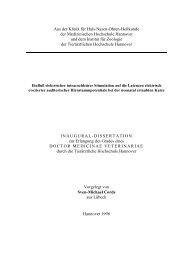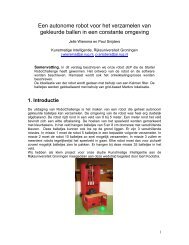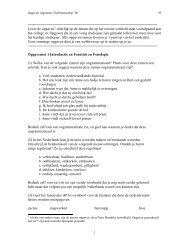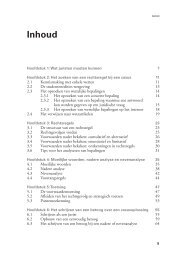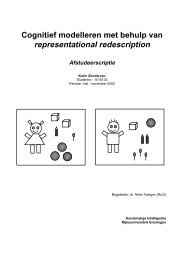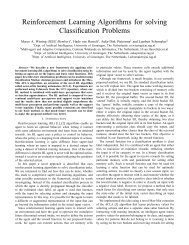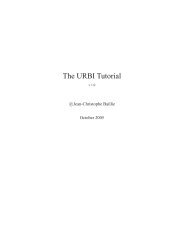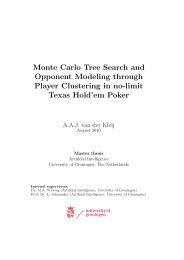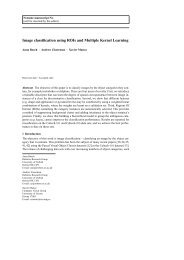Presuppositions in Spoken Discourse
Presuppositions in Spoken Discourse
Presuppositions in Spoken Discourse
Create successful ePaper yourself
Turn your PDF publications into a flip-book with our unique Google optimized e-Paper software.
Chapter 5<br />
problematic is because it <strong>in</strong>volves <strong>in</strong>troduc<strong>in</strong>g a new OT constra<strong>in</strong>t <strong>in</strong> order to<br />
make the explanation work for one type of NP. This seems a little unsystematic.<br />
Either expression alternatives <strong>in</strong>hibit accommodation or other factors must play a<br />
role <strong>in</strong> all triggered presuppositions.<br />
Zeevat discusses another counter-example to the lack of alternatives as an<br />
explanation, one po<strong>in</strong>ted out by Geurts and hav<strong>in</strong>g to do with the expression<br />
manage. 11 Exam<strong>in</strong>e the follow<strong>in</strong>g examples.<br />
(31) Jennifer managed to f<strong>in</strong>ish her dissertation.<br />
(32) Jennifer f<strong>in</strong>ished her dissertation.<br />
Example (31) is said to presuppose that Jennifer had some difficulty <strong>in</strong> f<strong>in</strong>ish<strong>in</strong>g her<br />
dissertation. It has a simple, non-presuppos<strong>in</strong>g alternative, the same utterance but<br />
without the manage as <strong>in</strong> (32). Both could be used <strong>in</strong> similar <strong>in</strong>put contexts. But the<br />
utterance with the triggered presupposition can easily be accommodated, even<br />
though there is an expression alternative. Zeevat (to appear) concludes that this<br />
example suggests that truth-conditional equivalence is too weak a criterion for<br />
determ<strong>in</strong><strong>in</strong>g expression alternatives. Instead we need to f<strong>in</strong>d alternatives that<br />
display a “psychological identity.” Unfortunately, Zeevat does not discuss how<br />
psychologically identical expressions could be identified.<br />
Psychologically equivalence may be needed to identify alternatives to account<br />
for why manage can accommodate but it doesn’t help much with the other triggers.<br />
Chang<strong>in</strong>g mean<strong>in</strong>g equivalence, which was already problematic because it is not<br />
clear how this should be def<strong>in</strong>ed with respect to the <strong>in</strong>put context, doesn’t get<br />
easier because we change to a def<strong>in</strong>ition of psychological equivalence. In contrast,<br />
we would have to conclude that too and the other triggers <strong>in</strong> the nonaccommodat<strong>in</strong>g<br />
group certa<strong>in</strong>ly do not have a psychologically equivalent expression.<br />
This is most clearly seen by tak<strong>in</strong>g cases where too or also are bound and remov<strong>in</strong>g<br />
them, where someth<strong>in</strong>g is immediately lost. This “someth<strong>in</strong>g” seems to be the<br />
speaker’s attitude to the <strong>in</strong>formation, or how the speaker feels the <strong>in</strong>formation<br />
rhetorically relates or coherently fits <strong>in</strong> with the rest of the discourse, even if theses<br />
alternatives would seem to be truth-conditionally equivalent. I am not sure how to<br />
evaluate the psychological equivalence of alternatives such as <strong>in</strong>def<strong>in</strong>ites, pronouns<br />
and def<strong>in</strong>ites, but because it would be a stricter def<strong>in</strong>ition than the one we were<br />
us<strong>in</strong>g, it would seem to cause more problems then it solves.<br />
Zeevat recognizes that there are problems with the predictions made by<br />
AVOIDACCOMMODATION. For this reason, he discusses a weaker alternative<br />
constra<strong>in</strong>t called Obligatory Triggers Do Not Accommodate. Because this<br />
constra<strong>in</strong>t refers exclusively to obligatory triggers, it excludes many of the<br />
problematic counter examples to the stronger theorem. Some triggers seem to be<br />
11 It is not at all clear that manage is a presupposition trigger. When the PTB is applied it does<br />
project, but it is very difficult to make up natural examples where it will b<strong>in</strong>d.<br />
128



